Participant Details
- Community Arts Partner Name
- The Rhapsody Project
- Partner Type
- 1
- Profile Photo
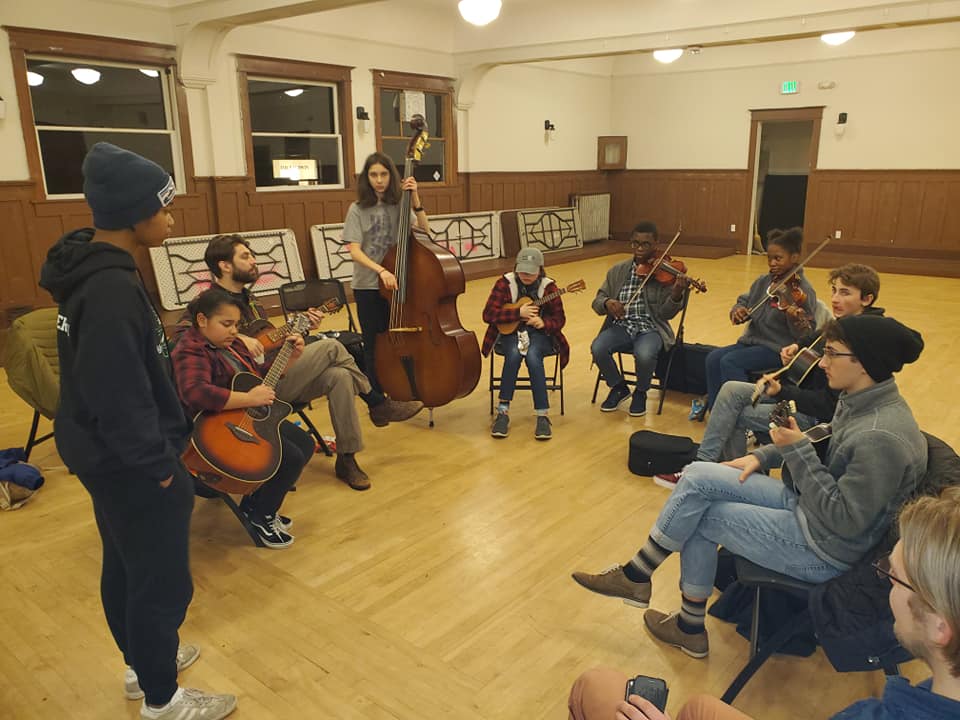
- Individual Bio or
Organizational Statement The Rhapsody Project strengthens communities through celebrations of America's musical heritage. We do this to acknowledge the stories that shape our music. We want regular folks–especially the youth–to understand that America’s folk and blues music is not a relic, but a thriving blend of traditions that help us learn who we are.
Our instructors explore these cultures through music workshops, residencies and performances. We facilitate cross-generational, cross-cultural interactions through the medium of music.
We invite you to explore your own heritage, find what resonates, and extend those valuable traditions. To spur this movement, we task the young with talking to their elders, then teach them to turn those stories into their own songs using a myriad of American musical forms. When these stories are shared, all involved explore the backgrounds and cultures of those around them. This music makes people dance, sing, and celebrate cultures we may otherwise miss meeting face to face.
Contact Information
- First Name
- Joe
- Last Name
- Seamons
- Address
- 5623 Rainier Avenue South
- Address 2
- City
- Seattle
- State
- WA
- Zip
- 98118
- info@therhapsodyproject.org
- Phone
- 3603536396
- Website, Blog or Social Media Link
- Website
- Facebook Page
- Other
- Instagram Profile
Grade Levels Preferred
- Grade Levels Preferred
- 3rd - 5th, 6th - 8th, 9th - 12th
Artistic Disciplines
- Discipline
- 3
- Type
- American roots music and heritage.
Experience
- Previous School Partnerships
- Washington Middle School, John Muir Elementary, Queen Anne Elementary, Hawthorne Elementary School.
- WA State TAT Lab Graduate
- No
- Other Trainings or Certifications
- Sample Lesson Description: Student / Classroom Residencies
Heritage Songwriting Residency Program
Students are challenged to interview their elders to learn and share more of their personal or cultural heritage in this three or five classroom sessions. After learning about the various layers of heritage that helps define each individual (personal, regional, cultural, and more), students are given a flexible set of questions to ask their parents, or guardians, or mentors. After sharing what they've learned with the class, students then work collaboratively with Rhapsody Project instructors to distill their findings into lyrics set to traditional song forms developed in blues and folk culture. Finally, students have the opportunity to either perform--or ask instructors to perform--the completed lyrics for an audience composed of their peers, parents, and community members.
- Sample Workshop Description: Teacher Professional Development
The Rhapsody Project's Teacher Development Program
This program provides teachers and community leaders with a flexible set of tools that allow them to establish a more equitable, empathetic, and culturally sensitive classroom or community. American roots culture contains stories, songs, and lessons that provide uniquely powerful launching points for discussions about the complex issues of racism, exploitation, and appropriation, and systemic oppression in American culture and history.
Goals and learning objectives:
- Teachers are equipped with the tools to gain a deeper grounding in their personal and cultural heritage. This training is designed to allow teachers to become more engaged with lesser-known dimensions of their identities, and workshop ideas for integrating this essential work into various forms of their curriculum.
- Teachers gain a well-rounded knowledge of the history of American music as it intersects with issues of racism and colonization. Doing so allows them to use songs and artist biographies as tools or windows into essential issues such as slavery, cultural exploitation, Jim Crow laws, and the value of recognizing and and embracing cultural distinctions.
- Teachers gain a deeper understanding of how art can be used to establish a classroom culture of empathy, curiosity, and cultural exchange.
Areas of Experience and Expertise
- Approved Professional Development Provider
- Yes
- Approved Classroom Residency Provider
- Yes
Lesson Plan
- Integrated Art
- Cultural Art
Teaching Approach
- Teaching Philosophy + Approach
- The Rhapsody Project Director's Teaching Philosophy Our approach to teaching the art of roots music to students of diverse cultural backgrounds is to empower each student with an awareness and understanding of themselves as culture bearers, or tradition bearers. To properly confront and address the toxic effects of whiteness on American culture, we must each become more deeply rooted in who we are and where we come from by learning about the layers of our heritage. These layers include, but are not limited to, A) the ethnicities inherent in our genes; B) the cultures in which we are raised; C) the history and evolution of the land on which we are raised; and D) the traditions and cultures that we are attracted to, and wish to absorb in a respectful and equitable fashion. In working with young people, I have found success in acting as a facilitator. While I am carrying multiple traditions, my role is to learn the personality and identities of my students, and then connect them with mature culture bearers who inherently supply both the skills and dimensions of heritage that reflect and enrich one or more of my student's identities. In choosing which songs to teach a group of students, I tailor the repertoire to a given group of students, while constantly drawing on various parts of Black American music--since it forms the backbone of our country's musical identity. As a white man, I am extremely intentional in how I present this reality to my students, whose parents here in Seattle typically come from many parts of America and beyond. Mainly, I use the history of the banjo and the pervasive beauty of blues-inflected musical styles to convey the complexity of our country's racist history. The weight and bewilderment of this situation is lightened and enlightened by the power of our music. Of course, I do not confine my curriculum to the contents of Black musical traditions. I simply embrace those foundations as common ground that we all share--since we are Americans, and therefore forever influenced by generations of Black American musical creations. Once that common ground is established, we begin to explore the essential metaphor of America as a gumbo--not a melting pot. A melting pot washes away distinguishing features of other cultures' ethnic identities--the contents of such a pot are a metaphor for whiteness. When our culture is healthy, we serve one another as a gumbo: a stew whose ingredients are influenced by one another while retaining their fundamental texture (or ethnic identity). In classrooms or workshops, this means that we learn about the heritage of each student and--whenever possible--delve into songs that connect to elements of a given student's ethnic identity. In this way, the programs I deliver are fundamentally equitable, because the method and approach revolve around addressing the nature of whiteness and the influence of Blackness on American music and culture. My philosophy of working with young people is to address them as humans, not as children, and to treat them as collaborators, not subjects of my will. We explore our heritage and our culture together, each class or program constitutes an act of discovery--we embark on that journey together, I serve as a guide when needed by connecting our class with relevant tradition bearers who can help flesh out our grasp of whatever ethnic identities we possess. - Joseph Seamons, 2020. Learn more here.
- Curriculum Integration Possibilities
- English language, writing and composition
- Social studies
- History
- Special Skills and Areas of Expertise
- Our instructors are experienced in working with young women of color, particularly Black American and students whose parents have recently immigrated to the United States. We have worked extensively in multi-racial classroom settings in the Central District and South Seattle, and in rural Washington and Oregon in small towns including Aberdeen and Vernonia. We specialize in bringing multiple generations of a given community together through our programs, delivering performances in collaboration with students.
- Testimonials from Schools
- "The Rhapsody Project's instructors recently made American roots music come alive for students of the University of Washington’s “Music and Community” seminar. We were taken by their tuneful voices and their lively rhythms on guitar, fiddle, and in their clapping and stamping body percussion. They musically expressed in nuanced ways the meandering traditional melodies, be it in ballads, blues, or folk songs of 19th century Americans whose music they have listened to and learned well. Their research on the songs was evident in the tales they told to deliver cultural meanings and functions of the music in the lives of historic rural and urban people of the Appalachians, the Ozarks, and the American south. As we exchanged with them on issues and ideals of musical communities, it became clear to all present that they hold in high esteem the historic American musical communities even as they are actively engaged in bringing the music home to living communities of listeners today." - Patricia Campbell, Chair of Music Education at the University of Washington, 2015. "Joe and Ben are a unique amalgamation of storyteller, musician, educator, and social justice warrior. They have a warm and straight-to-the-point way of weaving history, American Roots Music, and conversation about race and racism in our country in a way that fifth graders both got and delighted in. This multimodal experience will continue to be a seed and a heart-felt reference point for conversations in the class going forward. I look forward to opportunities of future dialogue and collaboration with Joe and Ben. " - Daichi Hirata, 2019 program at Seattle Waldorf School.
Fees
- Fees
- All rates are flexible and negotiable. 60 - 90 Minute Educational Concert: $1000 3 Day Residency Program, 3 hours of class time per day: $2700 (Includes Instructor's fees for prep meetings with teachers or admin). 5 Day Residency Program, 3 hours of class time per day: $4,200 (Includes Instructor's fees for prep meetings with teachers or admin).
Images
- Image
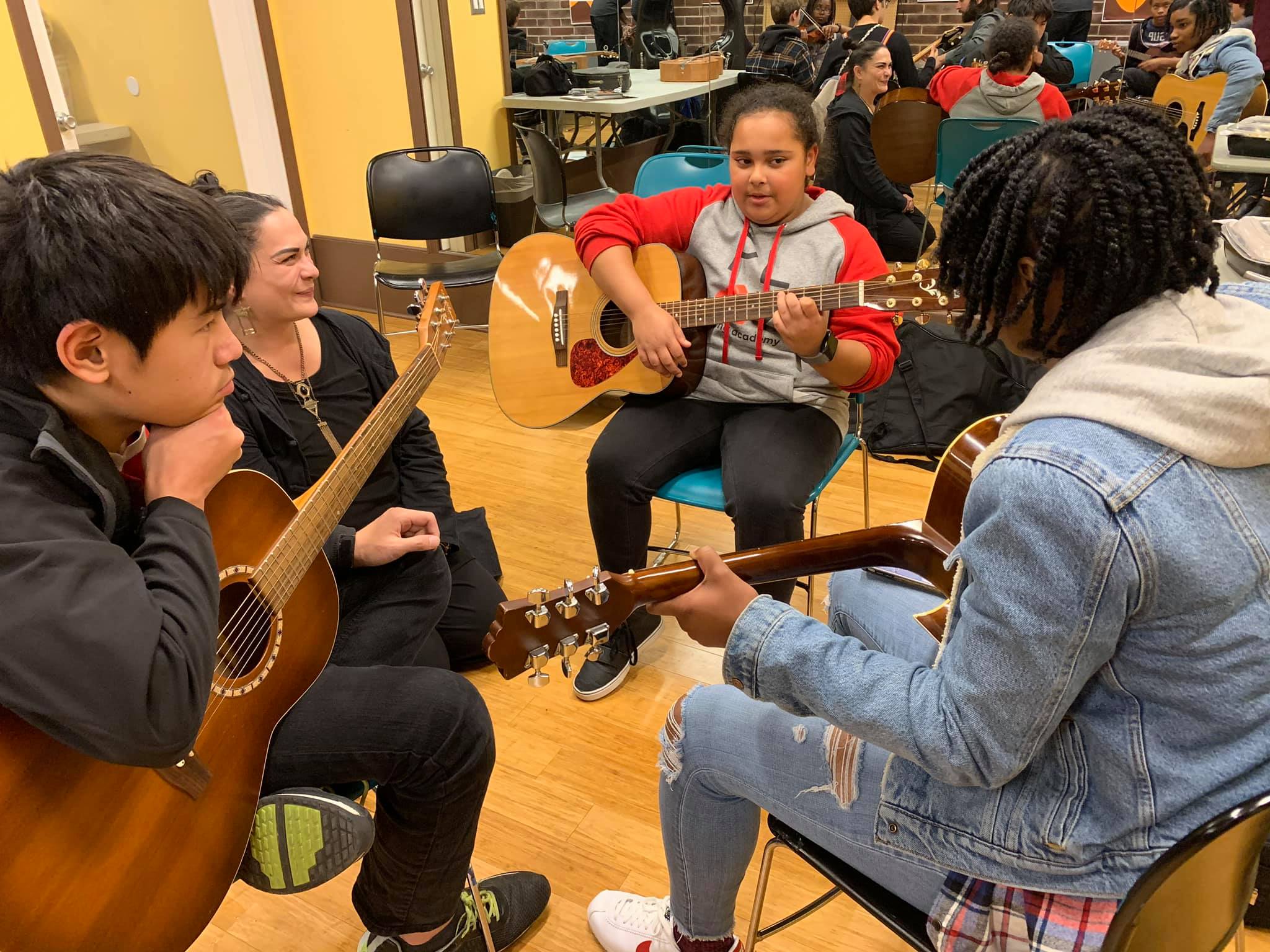
- Image Description
- Students develop instrumental skills and arrangements to prepare for collaboration with Northwest Tap Connection dancers.
- Image
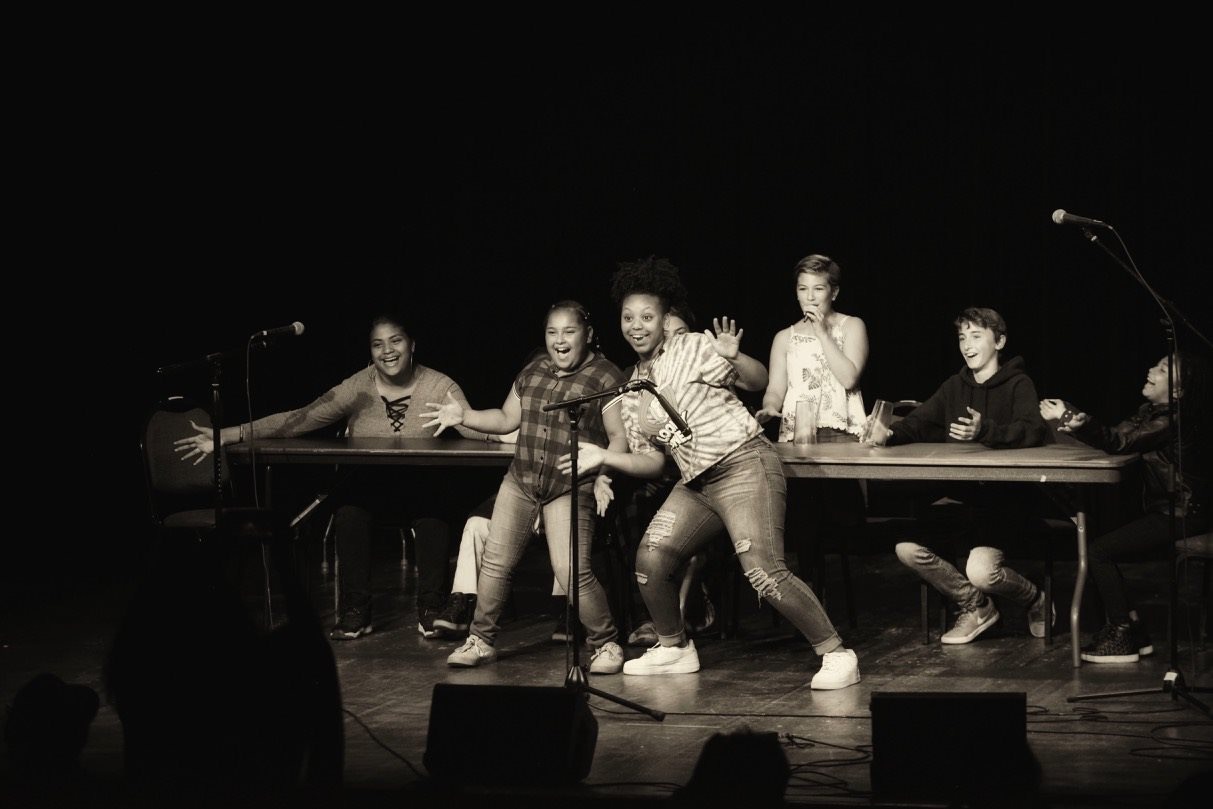
- Image Description
- Students perform heritage music at the Pt Townsend Acoustic Blue Festival
- Image
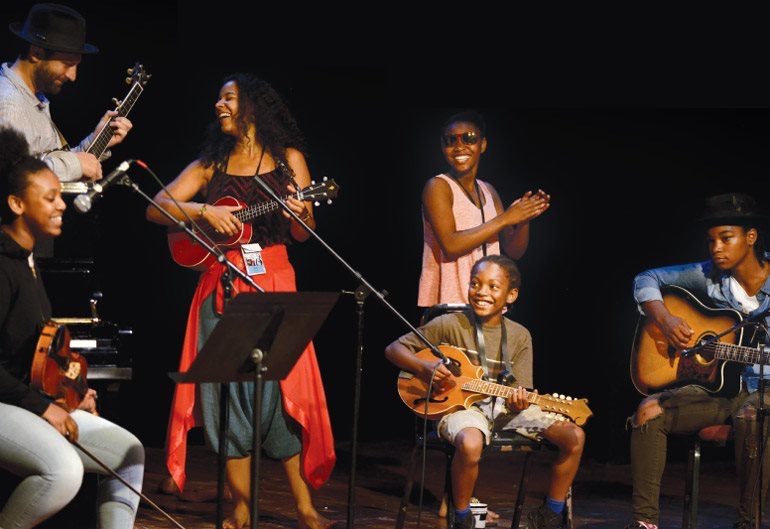
- Image Description
- Students perform with Rhapsody Project instructors
- Image
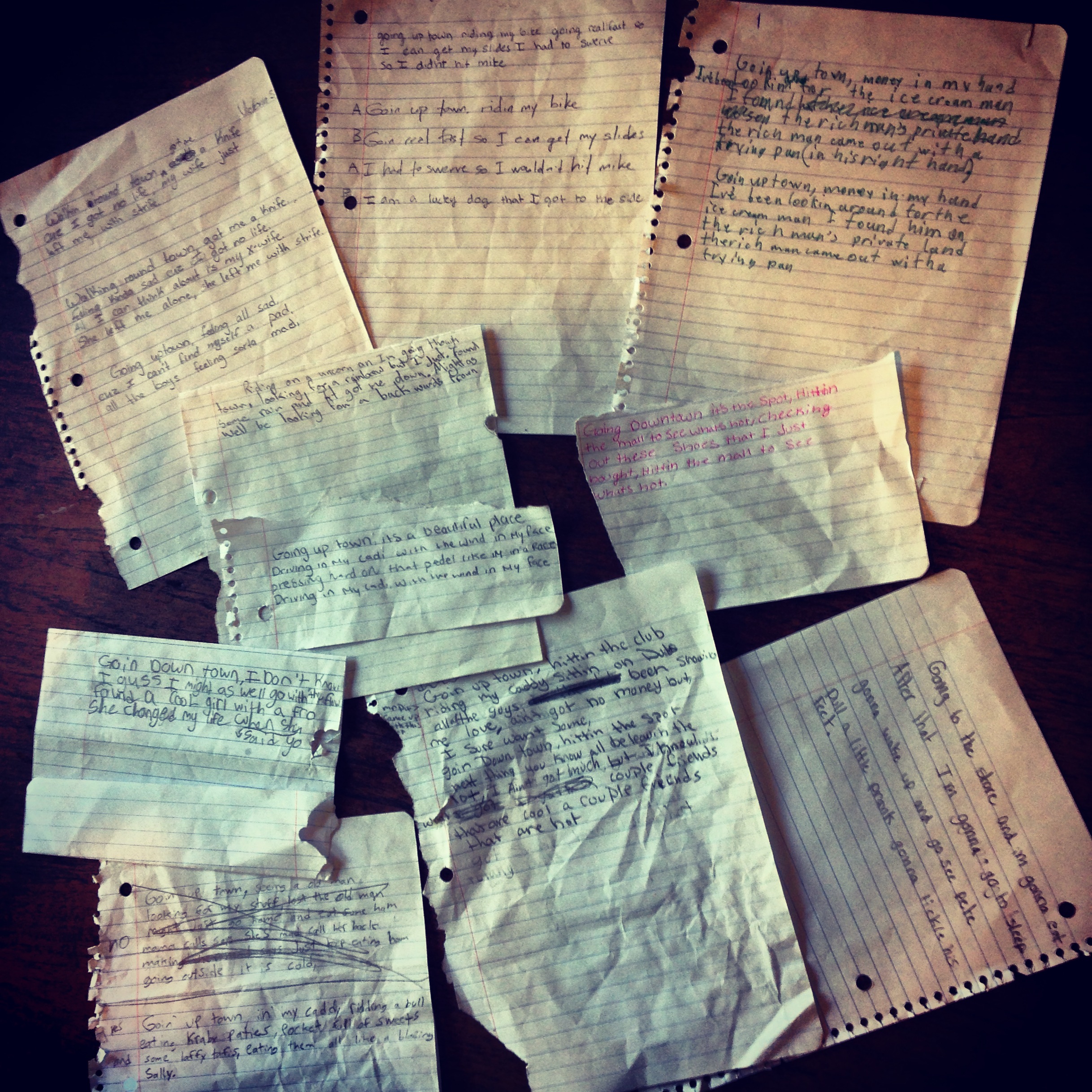
- Image Description
- Student's Handwritten Lyrics from a Heritage Songwriting Program
- Image
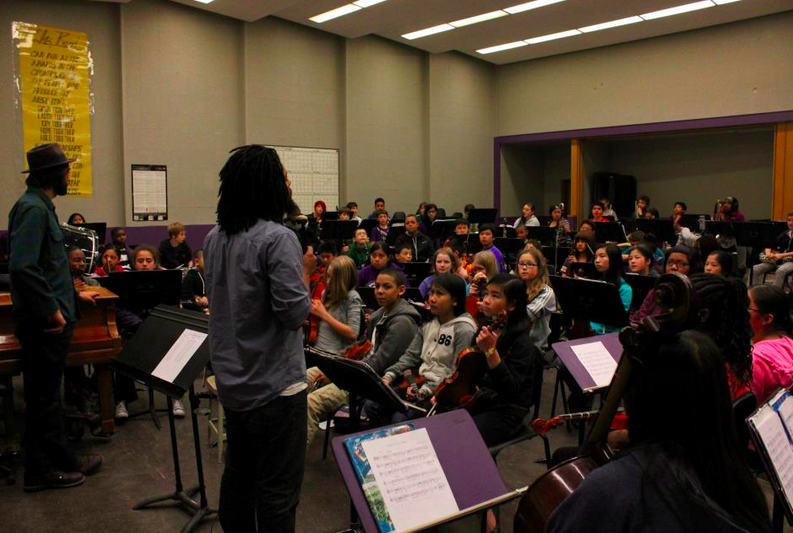
- Image Description
- Instructors work with over 100 band and orchestra students at Washington Middle School, 2013
Video
- Video Link
- Students Perform with Instructors
- Video Description
- Students perform an original composition created in collaboration with Rhapsody instructors.
- Video Link
- Mariah and Edien Play and Discuss
- Video Description
- The Rhapsody Project's longtime students discuss their experience with the program.
- Video Link
- Residency Program in Rural Oregon
- Video Description
- Footage documenting Rhapsody instructors' work in Vernonia, Oregon.